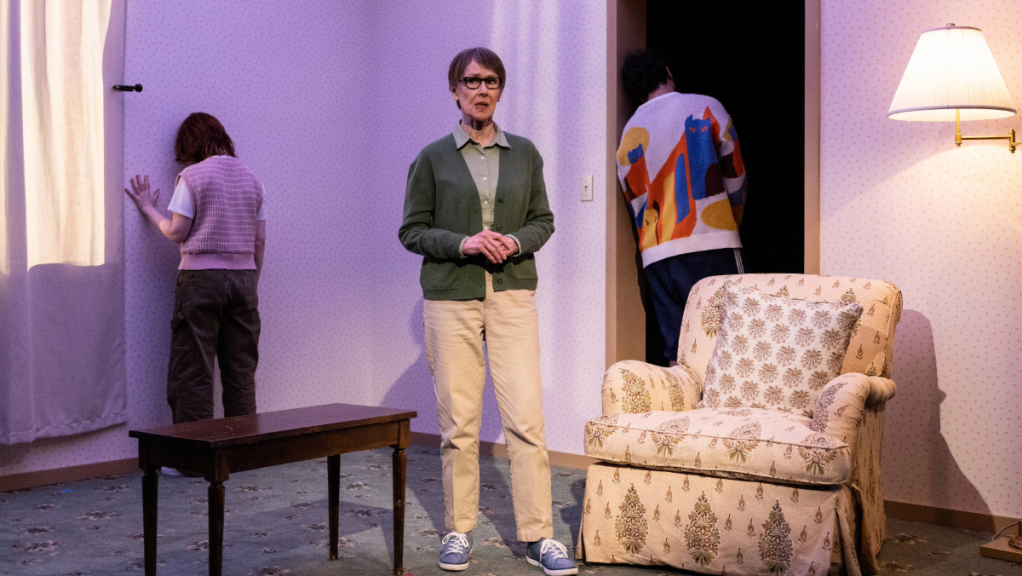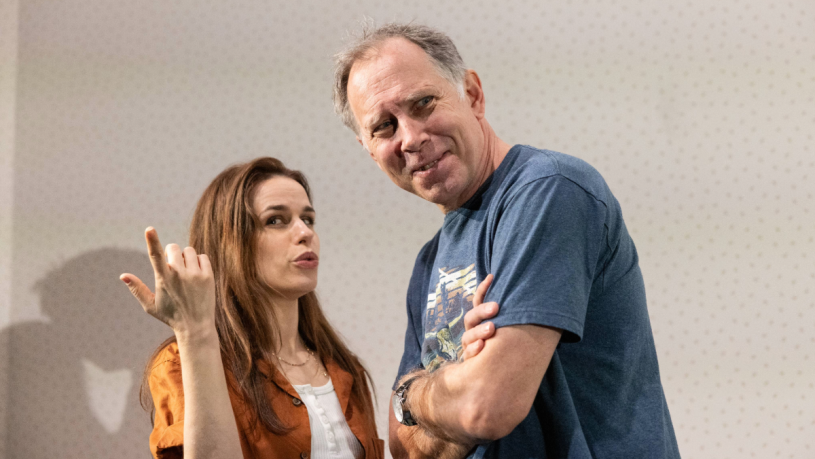Liza Birkenmeier’s Grief Hotel, a Clubbed Thumb production that reopened Wednesday at the Public Theater, is a fleet 80-minute drama that explores the weight of loss and the fragility of communication in the age of texting. We first meet Aunt Bobbi (Susan Blommaert), a spry senior citizen dressed in a cardigan, khakis and neatly laced sneakers, who maps out her idea for a bespoke, expensive retreat for young folks needing to check out of their day-to-day lives for a week or two after experiencing a loss — whether of a loved one, a relationship, or a job. Her pitch deck is hilariously laden with buzzwords she admits she doesn’t fully understand: “sustainability, Brené Brown, personality tests/astrology … green food, origins, origin stories, ethically sourced food, ethically sourced food origin stories.”
We also meet a loosely connected group of millennials who pretty gradually emerge as the target market for her hotel concept — and whose messy personal lives reflect a modern flexibility to gender and sexuality, one that must then be mediated through their addiction to technology and the awkward ways people communicate via machines. The insecure Winn (Ana Nogueira), who’s in an open relationship with Teresa (Susannah Perkins), meets a decades-older guy named Asher (Bruce McKenzie) interested in cheating on his wife. Winn’s ex-girlfriend from college, Em (Nadine Malouf), is hyperbolic drama queen who mostly ignores her puppy-dog boyfriend, Rohit (Naren Weiss), while spending four to five hours a day connecting with a chatbot named Melba that she’s convinced herself looks just like Winn if it only had a face.

Much of Birkenmeier’s dialogue mimics the halting dot-dot-dot rhythms of text messages and the distracted phone conversations we have while clutching our phones and juggling two conversations at once. Asher becomes resentful when Winn doesn’t respond to his queries right away (“I guess you’re not interested. Have a good life”), but immediately softens when she picks up the thread again. That neediness for connection even has a way of exploding the labels we place on ourselves. What does it mean for Winn, a self-identifying queer woman in a supposedly open relationship with another woman, to sneak off for trysts with a straight man two decades her senior (and keep that fact from partner)?
The characters in this 21st-century La Ronde can be bracingly funny, and there’s an absurdity built into director Tara Ahmadinejad’s staging, with characters bunched on stage but talking past each other, or slumped against the walls. The effect is amplified by the generic set design (by the collective dots) that mimics the waiting room of a plain-Jane Holiday Inn in need of an update.
Unfortunately, the generic quality sometimes extends to the characters themselves, who are seldom fleshed out enough to give real substance to their complicated circumstances. That includes Aunt Bobbi, a deus ex machina figure who remains mostly on the sidelines of the action while articulating the show’s central themes in poetic aphorisms (“Loss is fast, and grief is slow”). But with her buttoned-up manner and smooth school-librarian voice, Blommaert provides a firm ballast for all the lost souls checking into Grief Hotel that makes it worth a visit.

